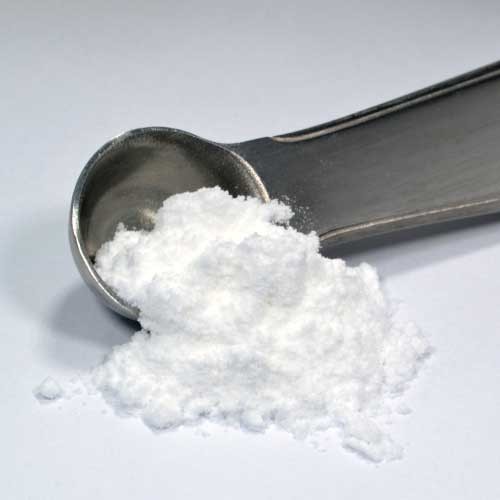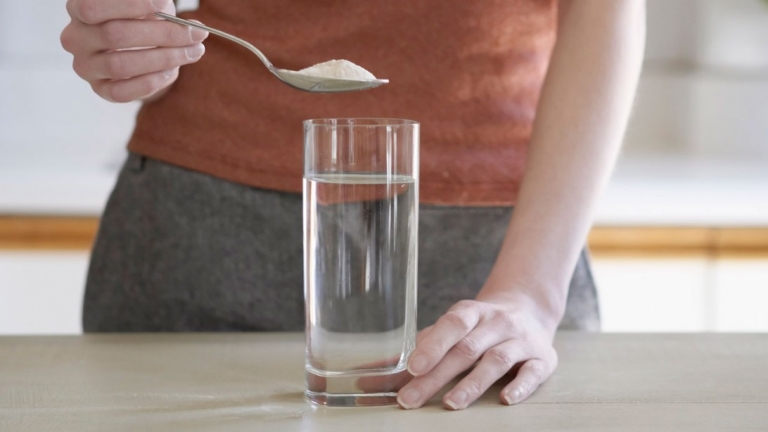If I were to recommend one supplement for vegans who train, my choice might surprise you – I’d say creatine monohydrate.
While protein really isn’t a problem for us vegans, our creatine levels could actually be a little low1 (but it’s easily fixed2). Even if they’re perfectly normal, adding a little extra can be quite beneficial!
Table of contents #
This is an article on vegan supplementation and I know some people believe vegans taking supplements somehow discredits veganism as a diet. So let’s get that out of the way first.
Omnivores get some of their creatine from eating muscles, blood, veins, tendons, etc. The highest concentration is found in steak, having 5 grams of creatine per 1.1 kilogram3.
This has three problems related to creatine:
You’d have to eat massive amounts of (cancerogenic) meat every day to reach the recommended levels of dietary creatine.
When meat is cooked part of its creatine contents is broken down to form the toxic N-methylacrylamide4.
Creatine in meat is absorbed four to eight times more inefficient than from supplements5.
Further, being creatine deficient is associated with depression6 and a decreased cognitive ability7.
Really – everyone should consider supplementing creatine.
Benefits of creatine #
Getting your creatine up to and above normal level has four main benefits:
Anaerobic endurance. Creatine works as an energy buffer for your muscles in the form of phosphocreatine8. With an increased level of it you’ll see an improvement when doing repeated high intensity efforts9, like lifting weights with a relatively high number of repetitions (10-15), and when sprinting repeatedly, like in many team sports. However, the greater your anaerobic ability the lesser boost you’ll receive from creatine10.
Increased strength. One review took 22 studies and found that creatine supplementation on average increased the subjects’ strength by 8%11. Not only that but they also got twice the strength gains from their continued resistance training! However, the review does note that the response is highly variable, so it could differ a lot from person to person.
Manages glucose. Supplementing creatine helps improve your glucose tolerance12, which could prevent diabetes. Creatine also offsets the decline in muscle GLUT4 that normally happens when you can’t move your muscles for a while13, making it interesting also for the injured (and the couch potato).
Sharpens your cognitive abilities. Should you ever be deprived of sleep (don’t – it’s terrible for your gainz!) you’ll be much better off if you’re supplementing creatine14.
The first two make creatine a perfect supplement for strength sports, such as CrossFit!
It’s worth noting that while these effects go away when you stop taking creatine, the results of the work you’ve done won’t. So if creatine helps you lift heavier, the increased weights will grow your base strength more than without creatine and when you stop supplementing you’ll still have your base strength.
You’ll see in forums that people claim creatine in itself builds muscles. Science kind of disagrees however15 16 17 18 (evidence being very weak). Any personal anecdotes are probably more related to the fact that you can do more work when supplementing creatine and thus will more easily build muscles.
There’s also the dubious claim is that creatine will increase your testosterone levels. One study has found that it does just that and lowers cortisol as well19. Another study (performed over a longer time period) showed that testosterone and cortisol were uneffected20.
How to supplement creatine #
There are a lot of variants of creatine but none of them have been proven to be any more efficient than good old creatine monohydrate. It’s also the cheapest so I see no reason why you’d buy anything else.

You can get it in pills, capsules, powder, or liquid form. Personally I prefer powder but you pick.
Be aware that liquid serum isn’t a very good form, because of the passive breakdown of creatine when mixed in water21. Keep that in mind if you ever mix your creatine for later use – try to keep it cold and consume it the same day.
The standard dosage is 5 grams per day. One study tried 0.03 grams per kilo lean body mass (~2.3 grams in the study) and still saw significant increases in muscle creatine22.
Some people recommend a loading phase, where you take an increased amount of creatine during a week before reverting to a maintenance phase with the normal amount. While this can speed up the process you’ll also risk feeling nauseous and having stomach cramps because of the large amounts of creatine.
Your creatine level will eventually reach its maximum even without loading22.
However, if you really want to, then try to spread the dose out over the day and if you still feel nauseated or have cramps, take the creatine with some food.
Recommendation: Mix 5 grams of creatine monohydrate in a glass of water and drink it first thing each morning, regardless of whether you train that day or not.
NB! It’s a cheap supplement and all but don’t go take extra big doses of creatine “just because”, as you could risk downregulating your body’s own transporters23.
Creatine FAQ #
Creatine is one of the most thoroughly researched supplements and no negative side effects have been found24 25 26 27 28. Still, here’s specific answers to some frequently asked questions.
Most creatine is synthetically created and 100% vegan. Capsules can however contain gelatine. Ask your specific supplier if you’re uncertain.
You won’t get muscle cramps from creatine30.
Taking creatine’s no problem for your liver or kidneys31 32 33. Unless you have an kidney injury or high risk of developing kidney problems (diabetes for example).
No other variant has proven to be more beneficial than creatine monohydrate (including creatine magnesium chelate, creatine pyruvate, creatine citrate, creapure (micronized creatine), buffered creatine (kre-alkalyn), creatine hydrochloride (con-cret), creatine hydrochloride, creatine ethyl ester).
Stomach cramping can happen when supplementing creatine with too little water.
Nausea and diarrhea can happen when you take too much creatine at once.
The added creatine in your muscles will soak up additional water and cause you to gain weight. This is water weight, not fat weight, and thus has no implications but to make you look a little more buff. Studies show increases ranging from 1 litre34 to 3.3 litres35. More moderate supplementation (~0.03 grams per kilo bodyweight) doesn’t seem to increase water retention36.
Creatine is a perfectly fine supplement even when “cutting” (losing fat). The weight gain above is in no way negative for your fat loss. If anything, the extra strength will help you burn even more calories.
One study once found contaminants in some of the creatine products they tested37. The biggest contaminant was creatinine – a natural breakdown of creatine and something our kidneys are perfectly adapted to deal with. The only heavy metal found (in 15% of the products) was mercury and in such low levels it’s well below the acceptable maximum daily intake.
The increased strength gained from creatine supplementation is thrown out the window if you also take caffeine38, e.g. drink coffee. You still get all the other benefits from creatine, just not the (slightly) increased strength.
Get some! #
I would wholeheartedly recommend that you start supplementing with creatine if you aren’t already. Especially if you’re a training vegan!
It doesn’t make much difference where you get your creatine. I buy mine from Bulk Powders – they have both great prices and high quality products. Plus, if you sign up with this link and order for at least £15 you and me both get a £5 discount!
My recommendation #
If you use the links above to buy some creatine, I get a small commission and it doesn’t cost you anything extra. It’s an easy (and free!) way to support Athlegan. As always, all the recommendations I give are my personal favorites and I’d give them regardless of any reward.
- Normal reference values for creatine, creatinine, and carnitine are lower in vegetarians↩
- Skeletal muscle total creatine content and creatine transporter gene expression in vegetarians prior to and following creatine supplementation:↩
- Elevation of creatine in resting and exercised muscle of normal subjects by creatine supplementation↩
- The role of creatine in the generation of N-methylacrylamide: a new toxicant in cooked meat↩
- Kinetics of creatine ingested as a food ingredient.↩
- 31P magnetic resonance spectroscopy in the frontal lobe of major depressed patients.↩
- Creatine and creatine deficiency syndromes: biochemical and clinical aspects.↩
- Systems bioenergetics of creatine kinase networks: physiological roles of creatine and phosphocreatine in regulation of cardiac cell function.↩
- Creatine and its potential therapeutic value for targeting cellular energy impairment in neurodegenerative diseases.↩
- Creatine supplementation as an ergogenic aid for sports performance in highly trained athletes: a critical review.↩
- Effects of creatine supplementation and resistance training on muscle strength and weightlifting performance.↩
- Effects of creatine supplementation on glucose tolerance and insulin sensitivity in sedentary healthy males undergoing aerobic training.↩
- Effect of oral creatine supplementation on human muscle GLUT4 protein content after immobilization.↩
- Effect of creatine supplementation and sleep deprivation, with mild exercise, on cognitive and psychomotor performance, mood state, and plasma concentrations of catecholamines and cortisol.↩
- Effect of in-season creatine supplementation on body composition and performance in rugby union football players.↩
- Effects of oral creatine and resistance training on serum myostatin and GASP-1.↩
- Effect of creatine and beta-alanine supplementation on performance and endocrine responses in strength/power athletes.↩
- Creatine monohydrate and resistance training increase bone mineral content and density in older men.↩
- Effects of short term creatine supplementation and resistance exercises on resting hormonal and cardiovascular responses↩
- The effects of creatine supplementation on muscular performance and body composition responses to short-term resistance training overreaching.↩
- Creatine serum is not as effective as creatine powder for improving cycle sprint performance in competitive male team-sport athletes.↩
- American College of Sports Medicine roundtable. The physiological and health effects of oral creatine supplementation.↩
- The creatine kinase system and pleiotropic effects of creatine.↩
- Few adverse effects of long-term creatine supplementation in a placebo-controlled trial↩
- Creatine supplementation during college football training does not increase the incidence of cramping or injury↩
- Does creatine supplementation hinder exercise heat tolerance or hydration status? A systematic review with meta-analyses↩
- Cramping and Injury Incidence in Collegiate Football Players Are Reduced by Creatine Supplementation↩
- Risk assessment for creatine monohydrate↩
- Does creatine supplementation hinder exercise heat tolerance or hydration status? A systematic review with meta-analyses↩
- Putting to rest the myth of creatine supplementation leading to muscle cramps and dehydration↩
- Studies on the safety of creatine supplementation↩
- Adverse effects of creatine supplementation: fact or fiction?↩
- Effect of short-term high-dose creatine supplementation on measured GFR in a young man with a single kidney↩
- Effects of training and creatine supplement on muscle strength and body mass.↩
- Creatine supplementation during resistance training in college football athletes.↩
- Low-dose creatine supplementation enhances fatigue resistance in the absence of weight gain.↩
- Levels of creatine, organic contaminants and heavy metals in creatine dietary supplements↩
- Caffeine counteracts the ergogenic action of muscle creatine loading.↩





